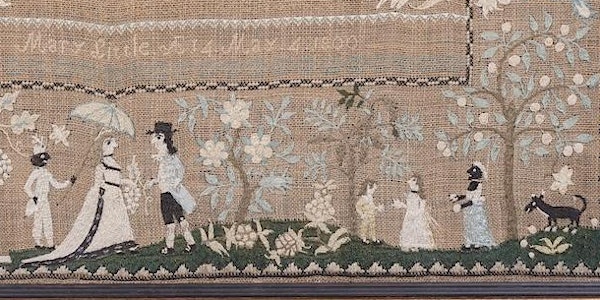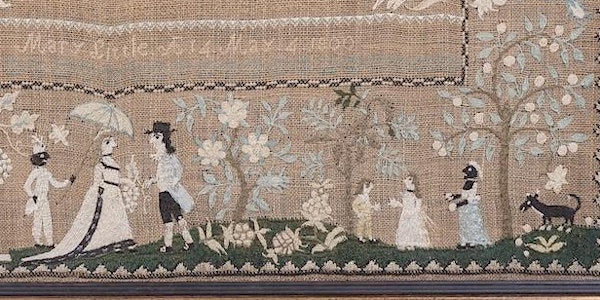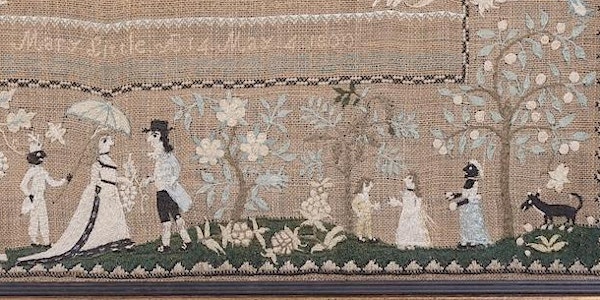Coinciding with the May 1 opening of a superb exhibition, Unnamed Figures, at Historic Deerfields, curator Emelie Gevalt of New York's American Folk Art Museum explores the way that early New England art portrayed Black New Englanders - or, in wishful thinking, painted them out of the picture. A new way of understanding our past.
ABOUT THIS EVENT
As early as 1825, a Connecticut preacher saw fit to make the statement that “slavery never existed here [in New England] to any considerable extent, and for years it has been a thing unknown.” Neither of these assertions was true. However, the speaker’s confidence was supported by a popular understanding that has remained common into the 21st century.
Despite powerful scholarship disproving New England’s wishful thinking about its past, the presence of early Black history in the region is still commonly forgotten. Drawing on doctoral research as well as Unnamed Figures, an ongoing exhibition project at the American Folk Art Museum and soon-to-be-opened exhibition at Historic Deerfield, this talk explores how, even in the context of such gaps in memory and the collective archive, historical images can further advance our understanding of Black experiences in early New England.
Contrary to what revisionist histories might imply in their diminishment of slavery in the region, a rare group of surviving portraits, overmantels, textiles, and other objects documents the presence of Black New Englanders in the 17th and 18th centuries. In comparison to established art historical tropes of Anglo-European imperial centers, this encapsulated history of Black representation in early New England is one of outliers.
The few works from these centuries that incorporate Black figures do so with a peculiarity that speaks to the distinctiveness of their colonial origins and to the contradictory expectations of household-centered slavery within the region.
Whereas imperial centers relied on long-standing Anglo-European tropes that rendered the Black figure as a highly codified and contained symbol, New England produced stranger compositions, in which patrons’ highly personal but conflicted relationships to enslaved people resulted in new levels of simultaneous intimacy and distance, displaying deep and complicated entanglements between Black and white experience.
This talk by Emelie Gevalt, curator of Unnamed Figures at the American Folk Art Museum in New York, will focus on a series of depictions of early African Americans in New England, including a late seventeenth-century portrayal of a Boston merchant; a family portrait from 1740s Matunuck, Rhode Island; a suite of overmantel landscapes from Revolutionary Connecticut; and a tribute to a formerly enslaved man in the form of a doll.
An examination of the idiosyncrasies of these images illuminates white artists’ and patrons’ conflicted relationships to slavery and Black presence, while simultaneously opening a window onto the lived experience of Black New Englanders.
Through the inclusion of little-known Black stories in relationship to these objects, this talk brings the supposed periphery into the center, questioning the assumption that the primary motivation behind a work is the most important basis for investigation, and aiming to restore in some small measure the realities of New England’s multicultural history amid a predominantly white visual record that has all but erased it.
ABOUT THE PRESENTER
Emelie Gevalt is curatorial chair for collections and curator of folk art at the American Folk Art Museum in New York City. Her exhibitions at AFAM include the critically acclaimed What that Quilt Knows About Me (2023) and Unnamed Figures: Black Presence and Absence in the Early American North (2023). Gevalt received her BA in art history and theater studies from Yale University and her MA from the Winterthur Program in American Material Culture. Her two decades of art-world experience include positions at the Museum of Fine Arts, Boston, and Christie’s, New York, where she was a vice president in the estates, appraisals and valuations department. She is a doctoral candidate in art history at the University of Delaware.
EXHIBITION DETAILS
Find out more about Unnamed Figures: Black Presence and Absence in the Early American North, here. If you're in New York, hasten! It closes at the American Folk Art Museum on March 24. If you're in New England, you can look forward to the opening of Unnamed Figures at Historic Deerfield on May 1, at the Flynt Center of Early New England Life. The blurb is here. We also highly recommend the magnificent catalogue!
PLEASE NOTE: We'll be recording this presentation and will post it on our website www.historicbostons.org and YouTube channel a few days after the event.
All presentations convey the views of the presenter and not necessarily those of the Partnership of Historic Bostons.
Image: Mary Little (b. 1786–1871?), sampler, Newburyport, Massachusetts, 1800, silk on linen, 18 x 22 in., William Butterworth Foundation, Moline, Illinois, 989.108.1


